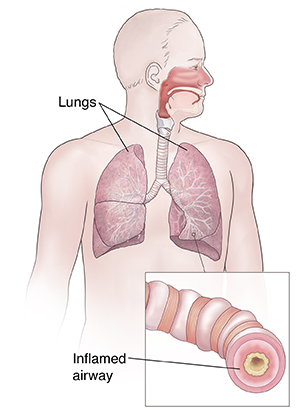Understanding Asthma
Asthma is a long-term (chronic) lung condition. It causes the airways (bronchial tubes) to swell and become narrow. The muscles around your airways start to tighten. When your airways start to narrow, air can't move in and out of your lungs very well. Mucus also builds up along the airways. This makes it even harder to move air in and out of your lungs.
Experts are not exactly sure what causes asthma. It may be caused by a mix of inherited and environmental factors. People with asthma may have no symptoms until they are exposed to an allergen or trigger.

Healthy lungs
Inside your lungs there are branching airways made of stretchy tissue. Each airway is wrapped with bands of muscle. The airways get smaller as they go deeper into the lungs. The smallest airways end in clusters of tiny balloon-like air sacs (alveoli). These clusters are surrounded by blood vessels. When you breathe in (inhale), air enters the lungs. It travels down through the airways until it reaches the air sacs. When you breathe out (exhale), air travels up through the airways and out of the lungs. The airways make mucus that traps particles you breathe in. Normally, the mucus is then swept out of the lungs by tiny hairs (cilia) that line the airways. The mucus is swallowed or coughed up during your day.
What the lungs do
The air you inhale contains oxygen. When oxygen reaches the air sacs, it passes into the blood vessels around the sacs. Your blood then sends oxygen to all of your cells. As you exhale, carbon dioxide is removed in a similar way from the blood around the air sacs, and then from your body.
When you have asthma
People with asthma have very sensitive airways. This means the airways react to certain things called triggers. Triggers can include pollen, dust, or smoke. Triggers cause inflammation. This makes the airways swell and become narrow. This is a long-lasting (chronic) problem. Your airways may not always be narrow enough so that you notice breathing problems.
Symptoms of inflammation from asthma include:
-
Coughing (chronic)
-
A feeling of tightness in your chest
-
Feeling short of breath
-
Wheezing (a whistling noise, especially when breathing out)
-
Low energy or feeling tired
In some people, over time chronic mild inflammation can lead to lasting (permanent) scarring of airways and loss of lung function.
Asthma flare-ups
When sensitive airways are irritated by a trigger, the muscles around the airways tighten. The lining of the airways swells. Thick, sticky mucus increases and partly clogs the airways. All of this makes it harder to breathe.
Symptoms of flare-ups may include:
-
Coughing, especially at night. You may not be able to sleep because of coughing.
-
Getting tired or out of breath easily
-
Wheezing
-
Chest tightness
-
Faster breathing when at rest
Flare-ups can be mild or life-threatening. In a severe flare-up, the muscle tightening, swelling, and mucus are worse. It’s very hard to breathe. Your body can't get enough oxygen and can't remove carbon dioxide. Waste gas is trapped in the alveoli. Gas exchange can’t occur. The body is not getting enough oxygen. Without oxygen, body tissues, especially brain tissue, begin to get damaged. If this goes on for long, it can lead to severe brain damage or death.
Call 911 (or have someone call for you) if you have any of these symptoms and they are not relieved right away by taking your quick-relief medicine as prescribed:
-
Trouble breathing
-
Feeling too short of breath to talk or walk
-
Lips or fingers turning blue
-
Feeling lightheaded or dizzy, as though you are about to pass out
-
Peak flow less than 50% of your personal best, if you use a peak flow meter
Managing your asthma
Asthma is a long-term condition. So it’s important to work with your healthcare provider to manage it. If you have asthma, you can prevent flare-ups. Develop an Asthma Action Plan with your healthcare provider. It can help control your asthma and manage your symptoms. An Asthma Action Plan also tells you and your family or friends what to do if your asthma flares up or gets worse.
Carry a medical alert ID card or wear a medical alert bracelet or necklace. This will help medical staff manage your asthma in case you can't talk easily with them. Your medical ID may include your name, asthma diagnosis, asthma medicines, allergies, and an emergency contact person.
Take your medicine as prescribed. Many people with asthma have to take daily medicines even when they feel well. This helps prevent asthma attacks. Also learn about your asthma triggers. Knowing what causes your asthma to flare up in the first place can help you prevent future breathing problems.
If you smoke, get help to quit. Don't use e-cigarettes or vaping devices because they have been linked to lung injury.
Stay up to date on your vaccines. This includes the COVID-19 vaccine and flu shot. Ask your healthcare provider what vaccines you should have.
How daily issues affect your health
Many things in your daily life impact your health. This can include transportation, money problems, housing, access to food, and child care. If you can’t get to medical appointments, you may not receive the care you need. When money is tight, it may be difficult to pay for medicines. And living far from a grocery store can make it hard to buy healthy food.
If you have concerns in any of these or other areas, talk with your healthcare team. They may know of local resources to assist you. Or they may have a staff person who can help.